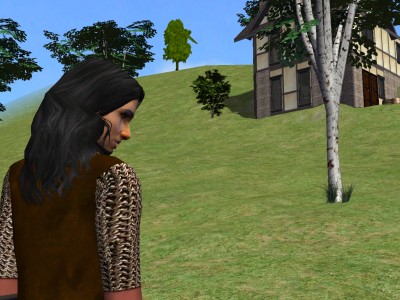
Brid Oswaldsson had built his house as far from the road as he could without placing it quite on the windy hilltop. The barn, the cowshed, and the other outbuildings thus stood between it and the road, and the house stood as aloof as a keep behind its curtain wall.
The farmhands had eyed Sir Sigefrith warily as he walked between the buildings. He did not like the look of them. Men with nothing to reproach themselves would not have avoided contact with him. Some of the shadiest-looking of these even scattered at his approach. It was as he had feared.
But the dust and clamor and shifty-eyed men of the farmyard fell away and were soon forgotten as he passed through a small birch grove and climbed towards the house. There were only the house and he left in the world; only the house between him and the deeply blue sky; only the house, and the silence of the tawny, wind-rumpled grass, and a few lonely trees, each standing well apart from the others. He could see why a man like Brid would choose to build his house among them.

He knew that if he turned to look, he would see the birches again, the barn and buildings behind, and beyond them the fields, the tower of his own house, and perhaps the roof of the church if he was high enough—but he did not turn. As long as he climbed, he could leave everything behind.

He had nearly reached the house when a slender figure in a drab gown dashed out and ran down the hill to meet him, her arms swinging wide to steady her on the steep descent. He stopped and smiled in anticipation, but as she grew closer he realized that she was her sister—or rather, the sister of the girl he had seen before.
“Sir,” she panted when she reached him. “We heard you were home. I mean—welcome home.”
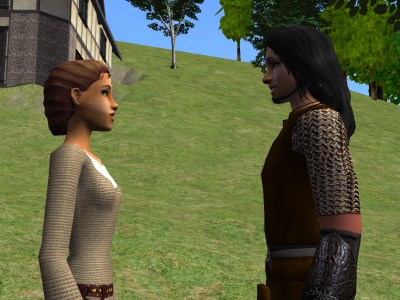
“I thank you.” He bowed.
She too was brown, but her skin lacked the translucency of her sister’s, and she was bolder in gesture and expression as well as color.
“Is there any trouble?” she asked. “I hope you haven’t heard anything you don’t like.”
“Should I have?” he laughed. “I’ve only been home a day. Here’s your chance to tell me your side of the story before the vicious gossips get to me.”
“What story?”

“Why—I don’t know! Make something up if you must.”
“What do you mean?”
“I don’t know myself.”
“Oh.”
“Ah… is your sister home?”
There, Sigefrith, that was certainly the thing to ask to make an awkward situation worse. He cursed himself for being such a looby.
“Oh, she—” The girl turned her head and looked up at the house. “That is…”
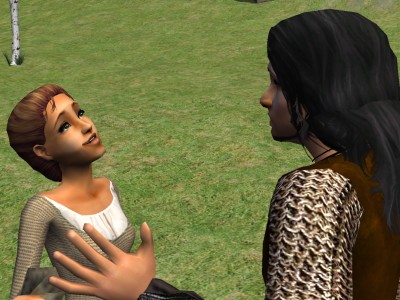
“Please, don’t allow me to disturb your family,” he said. “I spoke to her recently, so I only meant to ask her how—”
“Oh!” she interrupted when the door opened again and another small figure in a dun gown stepped outside. “There she is! It’s all right, come on in.”
She began walking, and he began following, but still he stammered, “As I said, I didn’t mean to disturb you—”
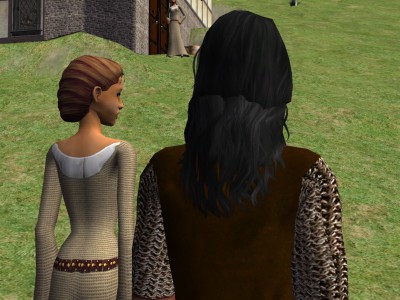
“Oh, you aren’t. It was only a mess in there when we saw you coming, and she sent me out to stall you, but I suppose she has straightened it up now.”
He laughed. “What’s the use of straightening up the mess if you tell me it was there anyway?”
“I don’t know!” She laughed with him. “Don’t tell her I told you. And, please, if you see a mouse, pretend it isn’t there. Our little mother can’t bear to see them killed, and it makes them quite bold.”
“Understood.”
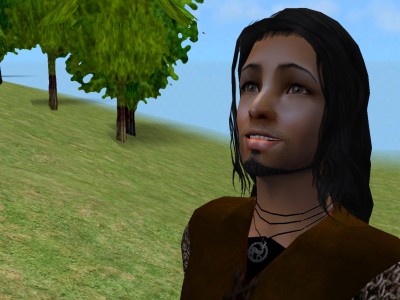
Wynflaed met them at the door, blushing already. Sigefrith bowed, and she curtseyed prettily and said, “Good day, sir.”
“Oh!” her sister gasped and curtseyed abruptly as well. “I forgot!”
“Mouse!” Wynflaed hissed under her breath. Sigefrith tried to peek inside, but the room was too dark for his eyes to allow him to see any mice, or even any men.
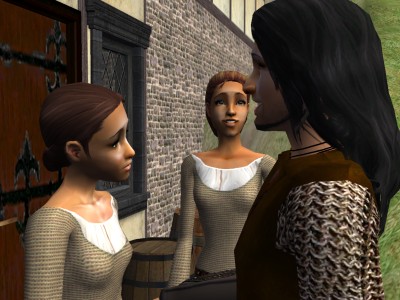
“Well, come in before we let all the flies in,” her sister drawled. Wynflaed blushed deeply enough that Sigefrith guessed she had told her sister all about their conversation.
“Come meet our little mother,” Wynflaed said softly.
“With pleasure,” he said.
“Please forgive our little mother if she doesn’t rise,” she whispered to him.
Sigefrith blinked desperately to try to clear away the haze of light that remained before his eyes. He could not see any mothers either.
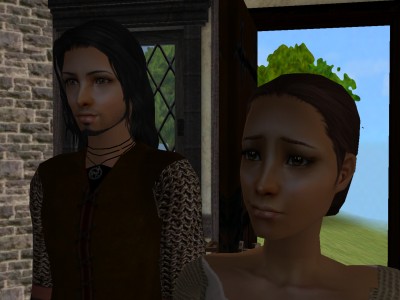
“Mother, don’t!” the girl cried as she stepped into the darkness.
“Now, I suppose I’m more polite than tired, dear,” a soft voice said from across the room. Once he knew where to look, Sigefrith could make out a big chair and a tiny woman trying to fumble her way out of it.
“Please, don’t,” he said. He crossed the room to her chair. “Not on my account. Your daughter may have told you that I am a very lazy man and like the ladies to sit so that I may permit myself to sit as well.”
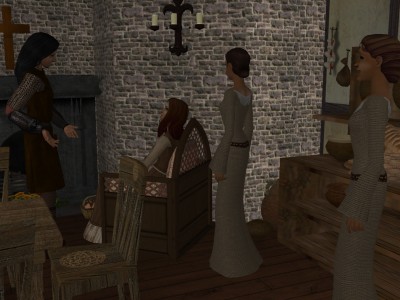
The mother said, “No, sir, I hope she is more polite than to say such things,” but she settled back into her chair.
Sigefrith bent to kiss her hand. By now he could see well enough to know from whom Wynflaed had her bronze eyes and the golden glow of her skin, but in the case of the mother, the translucency of her face revealed the sickness and sorrow beneath.
He glanced up at the daughter to reassure himself of her good health. Her face was bright, but her eyes were sad. He had not seen it before, when he had only been considering her fright of him. In truth, he was nothing to her. She only thought of her father.
“We’re so pleased to meet you,” the little mother said. “Won’t you sit down? Won’t you have a drink? Wynnie, won’t you get a drink for your lord?”

“You don’t think my throat is dry from that short climb, do you?” he smiled.
“Our little mother makes the best elderberry wine,” the other girl offered.
“I don’t make anything anymore,” the mother said softly. “My daughters are too modest to claim the credit. But I hope you will do them the honor of tasting it.”
“I shall rather be honored to be allowed to do so,” he said, and Wynflaed disappeared to fetch the wine.

“Won’t you have a seat?” her mother asked. She laughed softly. “I’m sorry I’m turned a little awkwardly for speaking, but I like to face the fire in all seasons. My girls bring me the yellow flowers in the warm months, so I can pretend.”
“It’s a charming idea,” Sigefrith said. Now that she mentioned it, he noticed the basket of golden flowers that stood where the logs should have lain.
“Our father used to pick her up, chair and all, and turn her around,” the younger girl said. “I’m certain you could, sir. She weighs nothing at all.”
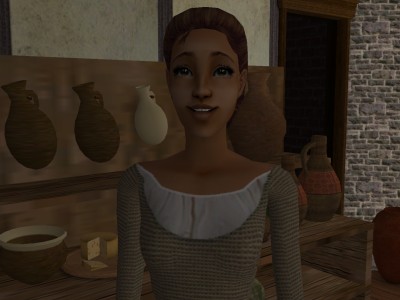
“Certainly,” Sigefrith said, but the little mother waved her hands to stop him.
“Certainly not! Oh, Mousie!”
“Mousie?” he laughed. “Is that your name?” he asked the girl.

“That’s what everyone calls me. My name is the same as my little mother’s, so it could be confusing.”
“Not at all,” the woman smiled. “We call her that because we like it. Everyone calls me little mother, even my husband, so there could have been no confusion. And I hope you will, too, sir. I haven’t been called by my name in so many years, I might not answer.”
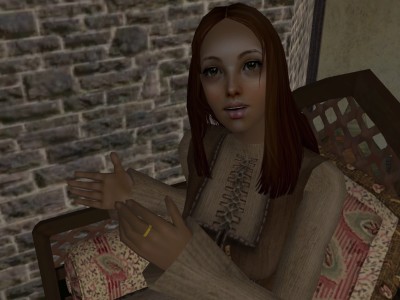
“I shall if you will call me only Sigefrith, and not sir,” he said. “Although, if you simply neglect to tell me your name, I shall be obliged to do as you ask.”

“Agreed,” she said with a little, tinkling laugh that made him imagine the merry girl she had been once. He did not think that Wynflaed was so very much like her mother after all—but perhaps Wynflaed had come into her cares at a younger age.






Can't we get rid of Hilda and let Sigefrith be happy with someone like Wynflaed? Or maybe Wynflaed herself? He could be so happy with someone who isn't out to make everyone miserable.